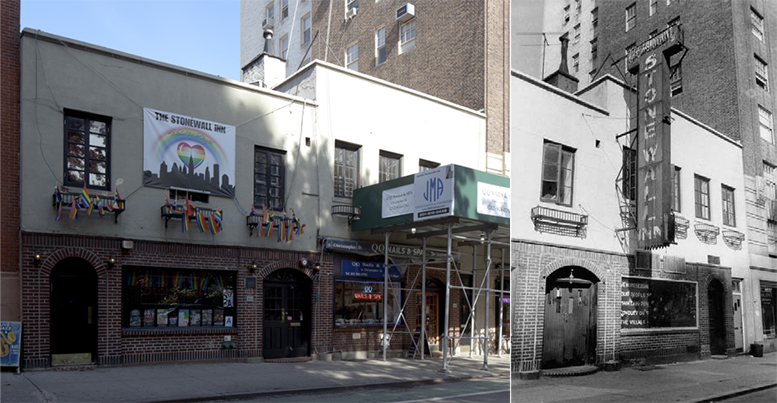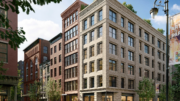The Stonewall Inn, landmark of the LGBT movement, is a step closer to becoming an actual landmark. On Tuesday, the Landmarks Preservation Commission voted to schedule (or calendar, in LPC speak) a public hearing to designate the bar at 51-53 Christopher Street as an individual landmark. That hearing will take place on Tuesday, June 23.
The move is somewhat unusual since the bar is in the Greenwich Village Historic District, which was designated on April 29, 1969, and is already protected by the LPC. For many, however, this move is long overdue, for the Stonewall Rebellion wouldn’t begin until June 28 of that year. That means that the designation report, which guides how to preserve the site, makes no mention of the events.
As the LPC’s research report states, “a police raid at this gay bar in Greenwich Village resulted in active resistance forcing the police to retreat into the bar, setting off five days of rioting and demonstrations with unprecedented cries for ‘gay pride’ and ‘gay power.’ The Stonewall uprising was the catalyst for a new more radical phase in the LGBT Liberation Movement. Within a few months, in direct response to Stonewall, several activist organizations were formed in New York City, including the Gay Liberation Front, the Gay Activists Alliance, Radical Lesbians, and the Street Transvestites Action Revolutionaries. Soon new organizations were being established across the U.S. and throughout the world to promote LGBT civil rights.”
The report adds that, “On June 28, 1970, the first anniversary of the Stonewall Rebellion was commemorated as Christopher Street Liberation Day; the main event was a march from Greenwich Village to Central Park. That day, Pride marches were also held in Los Angeles, San Francisco, and Chicago. Those celebrations have since grown into the internationally-celebrated LGBT Pride Month, with events held annually throughout the world.”
LPC Chair Meenakshi Srinivasan said she was “very proud” of the commission’s move and said there was “no better time” for it than at the outset of pride month. She said the events of 1969 “galvanized a movement that brought LGBT right to the fore with rippling effects across the country.” “LGBT rights and marriage equality are civil rights issues of our time,” she added. Commissioner Frederick Bland, who is, by profession, an architect, said he hoped more places of cultural history would be considered for designation outside their architectural merit (or lack thereof). “Buildings remember and they testify,” said Commissioner Adi Shamir-Baron.
The buildings themselves were originally stables constructed in 1843 and 1846 and were merged at the first floor and given a new façade in 1930. After being a bakery, it was taken over by the Stonewall Inn Restaurant. Following a fire, the restaurant reopened as the Stonewall Inn gay club/bar.
Andrew Berman, Executive Director of the Greenwich Village Society for Historic Preservation, told YIMBY that designating the Stonewall Inn as an individual landmark would give it an added layer of protection. “[These buildings] are special and this is why,” he said. “Few sites more powerfully embody the struggle for lesbian, gay, bisexual, and transgender rights, and for achieving a fairer and more just society, than the Stonewall Inn,” he added in a statement. “Stonewall represents brave and trailblazing social change, and is just one of many examples of how the Village and other communities of Lower Manhattan helped re-write history and change the world for the better.”
A public hearing will be held on Tuesday, June 23 at One Centre Street, ninth floor. Anyone is welcome to testify for three minutes a piece. Then the commission will vote on designation. It could happen that day, but it also might not.
Evan Bindelglass is a local freelance journalist, photographer, cinephile, and foodie. You can e-mail him, follow him on Twitter @evabin, or check out his personal blog.
Subscribe to YIMBY’s daily e-mail
Follow YIMBYgram for real-time photo updates
Like YIMBY on Facebook
Follow YIMBY’s Twitter for the latest in YIMBYnews





